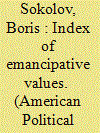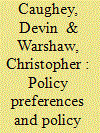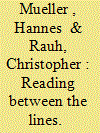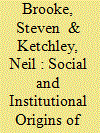|
|
|
Sort Order |
|
|
|
Items / Page
|
|
|
|
|
|
|
| Srl | Item |
| 1 |
ID:
159497


|
|
|
|
|
| Summary/Abstract |
Advertising expenditures in congressional campaigns are made not directly by campaigns themselves but indirectly though intermediary firms. Using a new dataset of revenues and costs of these firms, we study the markups that these firms charge candidates. We find that markups are higher for inexperienced candidates relative to experienced candidates, and PACs relative to candidates. We also find significant differences across the major parties: firms working for Republicans charge higher prices, exert less effort, and induce less responsiveness in their clients’ advertising expenditures to electoral circumstances than do their Democratic counterparts. We connect this observation to the distribution of ideology among individual consulting firm employees, arguing that these higher rents incentivize consultants to work against their intrinsic ideological motivations. The internal organization of firms reflects an attempt to mitigate this conflict of interest; firms are composed of ideologically homogeneous employees, and are more likely to work for ideologically proximate clients.
|
|
|
|
|
|
|
|
|
|
|
|
|
|
|
|
| 2 |
ID:
159502


|
|
|
|
|
| Summary/Abstract |
Do businesspeople who win elected office use their positions to help their firms? Business leaders become politicians around the world, yet we know little about whether their commitment to public service trumps their own private interests. Using an original dataset of 2,703 firms in Russia, I employ a regression discontinuity design to identify the causal effect of firm directors winning seats in subnational legislatures from 2004 to 2013. First, having a connection to a winning politician increases a firm’s revenue by 60% and profitability by 15% over a term in office. I then test between different mechanisms, finding that connected firms improve their performance by gaining access to bureaucrats and not by signaling legitimacy to financiers. The value of winning a seat increases in more politically competitive regions but falls markedly when more businesspeople win office in a convocation. Politically connected firms extract fewer benefits when faced with greater competition from other rent-seekers.
|
|
|
|
|
|
|
|
|
|
|
|
|
|
|
|
| 3 |
ID:
159499


|
|
|
|
|
| Summary/Abstract |
Is there a case to be made for the value, amidst relatively settled institutions, of unsettling speech—speech characterized by excess, impropriety, and even the uncanny? Much of contemporary deliberative theory would answer in the negative. This article, however, proposes that we can derive a defense of the deliberative value of immoderate speech from an unlikely source: Edmund Burke's theory and practice of the rhetorical sublime. Burke's account of the sublime was developed in response to an eighteenth-century discourse of civility that anticipated the anti-rhetorical strand of contemporary deliberative theory. By reconstructing Burke's response, we can recover a forceful defense of rhetoric in the present. For Burke, the disruptive practice of sublime speech can provoke circumstantial judgment, overcoming deliberators’ aversions to judging. Drawing on Burke's rhetorical practice alongside his aesthetic and linguistic theory, this article upholds a central role in deliberation for rhetoric, even in its unruly and excessive aspects.
|
|
|
|
|
|
|
|
|
|
|
|
|
|
|
|
| 4 |
ID:
159503


|
|
|
|
|
| Summary/Abstract |
International wars and interstate rivalry have been at the center of our understanding of the origin and expansion of state capacity. This article describes an alternative path to the development of state capacity rooted in domestic political conflict. Under conditions of intra-elite conflict, political rulers seize upon the temporary weakness of their rivals, expropriate their assets, and consolidate authority. Because this political consolidation increases rulers’ chances of surviving an economic elite’s challenge, it enhances their incentives to develop state capacity. These ideas are evaluated in post-revolutionary Mexico, where commodity price shocks induced by the Great Depression affected the local economic elite differentially. Negative shocks lead to increased asset expropriation and substantially higher investments in state capacity, which persist to the present.
|
|
|
|
|
|
|
|
|
|
|
|
|
|
|
|
| 5 |
ID:
159495


|
|
|
|
|
| Summary/Abstract |
We show that support for the Leave option in the Brexit referendum was systematically higher in regions hit harder by economic globalization. We focus on the shock of surging imports from China over the past three decades as a structural driver of divergence in economic performance across U.K. regions. An IV approach supports a causal interpretation of our finding. We claim that the effect is driven by the displacement determined by globalization in the absence of effective compensation of its losers. Neither overall stocks nor inflows of immigrants in a region are associated with higher support for the Leave option. A positive association only emerges when focusing on immigrants from EU accession countries. The analysis of individual data suggests that voters respond to the import shock in a sociotropic way, as individuals tend to react to the general economic situation of their region, regardless of their specific condition.
|
|
|
|
|
|
|
|
|
|
|
|
|
|
|
|
| 6 |
ID:
159506


|
|
|
|
|
| Summary/Abstract |
This article reports evidence of misspecification of the measurement model for the index of emancipative values, a value construct used as a key explanatory variable in many important contributions to political science. It shows that the scale on which the index is measured is noninvariant across cultural zones and countries in the World Values Survey. In addition, it demonstrates that the current index composition mixes different value dimensions and their actual associations with various political outcomes, in particular the index of effective democracy. However, an analysis using a novel approximate Bayesian approach shows that at least one specific subdimension of emancipative values, known as pro-choice values, truly exists and may be validly measured and compared cross-nationally. The article also contributes to the recent discussion on whether emancipative values are a reflective or a formative construct by providing thought experiments and empirical evidence supporting the former interpretation.
|
|
|
|
|
|
|
|
|
|
|
|
|
|
|
|
| 7 |
ID:
159500


|
|
|
|
|
| Summary/Abstract |
Politicians shirk when their performance is obscure to constituents. We theorize that when politician performance information is disseminated early in the electoral term, politicians will subsequently improve their performance in anticipation of changes in citizens’ evaluative criteria and possible challenger entry in the next election. However, politicians may only respond in constituencies where opposition has previously mounted. We test these predictions in partnership with a Ugandan civil society organization in a multiyear field experiment conducted in 20 district governments between the 2011 and 2016 elections. While the organization published yearly job duty performance scorecards for all incumbents, it disseminated the scorecards to constituents for randomly selected politicians. These dissemination efforts induced politicians to improve performance across a range of measures, but only in competitive constituencies. Service delivery was unaffected. We conclude that, conditional on electoral pressure, transparency can improve politicians’ performance between elections but not outcomes outside of their control.
|
|
|
|
|
|
|
|
|
|
|
|
|
|
|
|
| 8 |
ID:
159501


|
|
|
|
|
| Summary/Abstract |
A considerable body of work in political science is built upon the assumption that politicians are more purposive, strategic decision makers than the citizens who elect them. At the same time, other work suggests that the personality profiles of office seekers and the environment they operate in systematically amplifies certain choice anomalies. These contrasting perspectives persist absent direct evidence on the reasoning characteristics of representatives. We address this gap by administering experimental decision tasks to incumbents in Belgium, Canada, and Israel. We demonstrate that politicians are as or more subject to common choice anomalies when compared to nonpoliticians: they exhibit a stronger tendency to escalate commitment when facing sunk costs, they adhere more to policy choices that are presented as the status-quo, their risk calculus is strongly subject to framing effects, and they exhibit distinct future time discounting preferences. This has obvious implications for our understanding of decision making by elected politicians.
|
|
|
|
|
|
|
|
|
|
|
|
|
|
|
|
| 9 |
ID:
159498


|
|
|
|
|
| Summary/Abstract |
Using eight decades of data, we examine the magnitude, mechanisms, and moderators of dynamic responsiveness in the American states. We show that on both economic and (especially) social issues, the liberalism of state publics predicts future change in state policy liberalism. Dynamic responsiveness is gradual, however; large policy shifts are the result of the cumulation of incremental responsiveness over many years. Partisan control of government appears to mediate only a fraction of responsiveness, suggesting that, contrary to conventional wisdom, responsiveness occurs in large part through the adaptation of incumbent officials. Dynamic responsiveness has increased over time but does not seem to be influenced by institutions such as direct democracy or campaign finance regulations. We conclude that our findings, though in some respects normatively ambiguous, on the whole paint a reassuring portrait of statehouse democracy.
|
|
|
|
|
|
|
|
|
|
|
|
|
|
|
|
| 10 |
ID:
159507


|
|
|
|
|
| Summary/Abstract |
Read throughout the world, H. G. Wells was one of the most famous political thinkers of the early twentieth century. During the first half of the 1900s, he elaborated a bold and idiosyncratic cosmopolitan socialist vision. In this article, I offer a new reading of Wells's political thought. I argue that he developed a distinctive pragmatist philosophical orientation, which he synthesized with his commitments to Darwinian evolutionary theory. His pragmatism had four main components: a nominalist metaphysics; a verificationist theory of truth; a Jamesian “will to believe”; and a conception of philosophy as an intellectual exercise dedicated to improving practice. His political thought was shaped by this philosophical orientation. Wells, I contend, was the most high-profile pragmatist political thinker of the opening decades of the twentieth century. Acknowledging this necessitates a re-evaluation of both Wells and the history of pragmatism.
|
|
|
|
|
|
|
|
|
|
|
|
|
|
|
|
| 11 |
ID:
159504


|
|
|
|
|
| Summary/Abstract |
This article provides a new methodology to predict armed conflict by using newspaper text. Through machine learning, vast quantities of newspaper text are reduced to interpretable topics. These topics are then used in panel regressions to predict the onset of conflict. We propose the use of the within-country variation of these topics to predict the timing of conflict. This allows us to avoid the tendency of predicting conflict only in countries where it occurred before. We show that the within-country variation of topics is a good predictor of conflict and becomes particularly useful when risk in previously peaceful countries arises. Two aspects seem to be responsible for these features. Topics provide depth because they consist of changing, long lists of terms that make them able to capture the changing context of conflict. At the same time, topics provide width because they are summaries of the full text, including stabilizing factors.
|
|
|
|
|
|
|
|
|
|
|
|
|
|
|
|
| 12 |
ID:
159505


|
|
|
|
|
| Summary/Abstract |
Under what conditions did the first Islamist movements organize? Which social and institutional contexts facilitated such mobilization? A sizable literature points to social and demographic changes, Western encroachment into Muslim societies, and the availability of state and economic infrastructure. To test these hypotheses, we match a listing of Muslim Brotherhood branches founded in interwar Egypt with contemporaneous census data on over 4,000 subdistricts. A multilevel analysis shows that Muslim Brotherhood branches were more likely in subdistricts connected to the railway and where literacy was higher. Branches were less likely in districts with large European populations, and where state administration was more extensive. Qualitative evidence also points to the railway as key to the movement’s propagation. These findings challenge the orthodoxy that contact between Muslims and the West spurred the growth of organized political Islam, and instead highlight the critical role of economic and state infrastructure in patterning the early contexts of Islamist activism.
|
|
|
|
|
|
|
|
|
|
|
|
|
|
|
|
| 13 |
ID:
159496


|
|
|
|
|
| Summary/Abstract |
Recent work by party scholars reveals a widening gap between the normative ideals we set out for political parties and the empirical evidence that reveals their deep and perhaps insurmountable shortcomings in realizing these ideals. This disjunction invites us to consider the perspective of David Hume, who offers a theory of the value and proper function of parties that is resilient to the pessimistic findings of recent empirical scholarship. I analyze Hume's writings to show that the psychological experience of party informs the opinions by which governments can be considered legitimate. Hume thus invites us to consider the essential role parties might play in securing legitimacy as that ideal is practiced or understood by citizens, independent of the ideal understandings of legitimacy currently being articulated by theorists. My analysis contributes to both recent party scholarship and to our understanding of the role of parties in Hume's theory of allegiance.
|
|
|
|
|
|
|
|
|
|
|
|
|
|
|
|
|
|
|
|
|